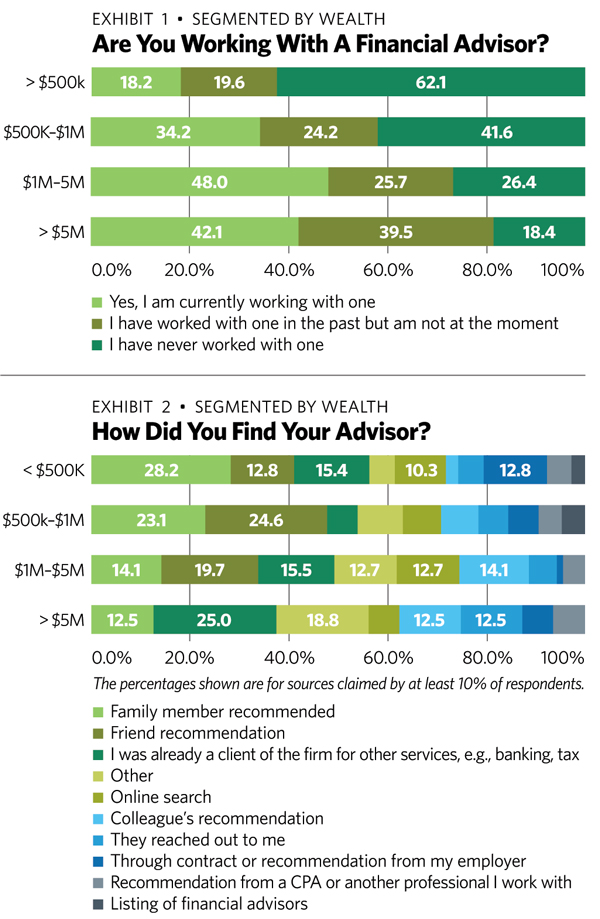In our article last month we examined how prospects, when searching for an advisor, trust the recommendations of their friends and family the most, but they also notice brands and assign a lot of importance to the reputation of the firm. The survey conducted by The Ensemble Practice LLC among consumers with over $100,000 in income reveals that while “Who can I trust?” is the fundamental question all investors ask, there are significant differences in who they ask this question to based on their wealth, age, gender and sources of wealth.
Wealth Makes A Difference
Wealthy investors (i.e., people with a net worth over $1 million) approach their search for an advisor differently. They are less likely to consider the recommendation of a friend, relying more on the opinions of other advisors (such as CPAs and attorneys). They are more likely to shop around, interviewing more than one advisor before making their choice. They are also more likely to already be using the firm for other services. Once they enter into an advisory relationship, the wealthy are more likely to be disappointed by their advisor and less likely to make a referral.
 Age Also Matters (But Wealth Matters More)
Age Also Matters (But Wealth Matters More)
The likelihood of an individual working with an advisor increases steadily with age. Only 18.4% of Gen Z consumers (under 25 years of age) work with an advisor. Compare this to 38.7% of baby boomers (between 57 and 75 years of age) and 45.5% of the silent generation (over 75 years of age). That said, young consumers with high levels of wealth (over $1 million in net worth) behave more similarly to older consumers with comparable levels of wealth than their less wealthy peers in the same age cohort. All age groups rely primarily on the recommendation of someone they trust when selecting an advisor, even if younger consumers are more likely to gather information from online sources.
Women Are Underserved And Choose Differently
Female consumers are less likely to have an advisor (29.5%) than male consumers (36.2%). They also trust their friends and family more than men do when it comes to choosing an advisor (24.1% of women versus 14.0% of men rely on the recommendation of a friend or family member). Compared to their male counterparts, females are less impressed with sales presentations (8.0% versus 15.0% of men) and more concerned that they do not know how to choose an advisor (23.7% versus 18.8% of men).
Business Owners Are A Different Breed
Both during the process of selecting their advisor and afterward when engaging in the relationship, business owners exhibit unique behavior. They are more impressed by presentations (23.1%) than consumers at large (12.0%) and rely more on their CPAs for recommendations (15.4% of business owners versus 9.4% of all consumers). Once in an advisory relationship, they are more likely to be promoters of their advisor (30.8% versus 19.4% of all consumers) and make referrals (79.6% versus 52.9% of all consumers).
Let’s elaborate on each of the demographic categories.
Wealth Matters The Most
The popularity of professional financial advice as a service moves in tandem with wealth, increasing as we look at higher levels of wealth in the consumer pool. Indeed, this conclusion is intuitive, and advisors are already aware of the correlation. As shown in Exhibit 1 below, only 18.2% of people with less than $500,000 in wealth work with an advisor. Compare this to 34.2% of consumers with between $500,000 and $1 million in wealth, 48.0% of those with a net worth between $1 million and $5 million and 42.1% of the wealthiest consumers.
While people in general rely primarily on the advice of friends and family when exploring potential advisors, the wealthiest investors depend far less on the recommendations of family and appear to have no friends. As shown in Exhibit 2, only 12.5% of consumers with over $5 million in net worth found their advisor through a family member, and none reported finding their advisor through a friend. Compare this to the behavior of those with net worth under $500,000, over 40% of whom relied on the recommendation of a family member (28.2%) or friend (12.8%) when selecting their advisor.
Another interesting behavioral distinction illustrated in Exhibit 2 is that the highest wealth category of investor is much more likely to rely on an existing firm relationship when selecting an advisor. The wealthiest investors are also more likely to have considered “other” sources of recommendation when selecting their advisor (18.8%), providing write-in responses such as “I followed the advisor through different companies.”
Another significant behavioral difference correlated with an individual’s wealth is the number of advisors considered during the examination stage. The more wealth a person has, the more likely they are to consider multiple advisors before ultimately selecting one. Only 23.1% of people with a net worth less than $500,000 considered multiple advisors during their selection process. In contrast, 56.3% of consumers with a net worth greater than $5 million shopped around interviewing more than two advisors.








